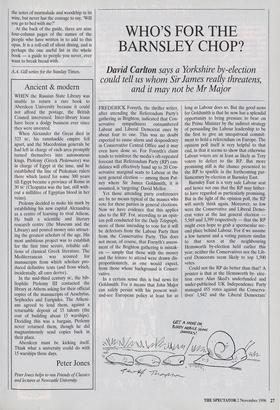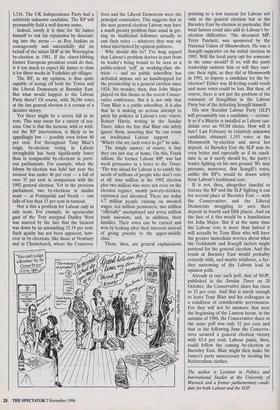WHO'S FOR THE BARNSLEY CHOP?
David Carlton says a Yorkshire by-election
could tell us whom Sir James really threatens, and it may not be Mr Major
FREDERICK Forsyth, the thriller writer, after attending the Referendum Party's gathering in Brighton, indicated that Con- servative sympathisers outnumbered Labour and Liberal Democrat ones by about four to one. This was no doubt expected to cause alarm and despondency in Conservative Central Office and it may even have done so. For Forsyth's claim tends to reinforce the media's oft-repeated forecast that Referendum Party (RP) can- didates will effectively hand up to 20 Con- servative marginal seats to Labour at the next general election — among them Put- ney where Sir James Goldsmith, it is assumed, is 'targeting' David Mellor.
Yet those attending party conferences are by no means typical of the masses who vote for these parties in general elections. Now we have evidence that this applies also to the RP. For, according to an opin- ion poll conducted for the Daily Telegraph, more of those intending to vote for it will be defectors from the Labour Party than from the Conservative Party. This does not mean, of course, that Forsyth's assess- ment of the Brighton gathering is mistak- en — simply that those with the money and the leisure to attend were drawn dis- proportionately, as one would expect, from those whose background is Conser- vative.
In a certain sense this is bad news for Goldsmith. For it means that John Major can safely persist with his present wait- and-see European policy at least for as long as Labour does so. But the good news for Goldsmith is that he now has a splendid opportunity to bring pressure to bear on the Prime Minister by the indirect strategy of persuading the Labour leadership to be the first to give an unequivocal commit- ment to hold a referendum on Europe. The opinion poll itself is very helpful to that end, in that it seems to show that otherwise Labour voters are at least as likely as Tory voters to defect to the RP. But more promising still is the chance presented to the RP to sparkle in the forthcoming par- liamentary by-election at Barnsley East.
Barnsley East is a very safe Labour seat and hence not one that the RP may hither- to have regarded as particularly promising. But in the light of the opinion poll, the RP will surely think again. Moreover, so low were the Conservative and Liberal Demo- crat votes at the last general election 5,569 and 3,399 respectively — that the RP might even hope to grab a spectacular sec- ond place behind Labour. For if we assume a low turnout and a voting pattern similar to that seen at the neighbouring Hemsworth by-election held earlier this year, neither the Conservatives nor the Lib- eral Democrats seem likely to top 1,500 votes.
Could not the RP do better than that? A pointer is that at the Hemsworth by- elec- tion even Alan Sked's underfunded and under-publicised UK Independence Party managed 455 votes against the Conserva- tives' 1,942 and the Liberal Democrats' 1,516. The UK Independence Party had a relatively unknown candidate. The RP will presumably field a well-known name.
Indeed, surely it is time for Sir James himself to risk his reputation by descend- ing into the arena — as Roy Jenkins so courageously and successfully did on behalf of the infant SDP at the Warrington by-election in 1981. If the claret-bibbing former European president could do that, is it too much to expect Sir James to slum it for three weeks in Yorkshire pit villages.
The RP, in my opinion, is thus quite capable of seeing off both the Tories and the Liberal Democrats at Barnsley East. But what would happen to the Labour Party there? Of course, with 30,346 votes at the last general election it is certain of a decisive victory.
Yet there might be a severe fall in its vote. This may occur for a variety of rea- sons. One is that the turnout, with or with- out the RP intervention, is likely to be appallingly low — possibly even below 40 per cent. For throughout Tony Blair's reign, by-election voting in Labour strongholds has been significantly lower than in comparable by-elections in previ- ous parliaments. For example, when the Islwyn by-election was held last year the turnout was under 46 per cent — a fall of over 35 per cent in comparison with the 1992 general election. Yet in the previous parliament, two by-elections in similar seats — at Pontypridd and Neath — saw falls of less than 15 per cent in turnout.
Nor is this a problem for Labour only in safe seats. For example, its spectacular gain of the Tory marginal Dudley West was marred by the fact that the turnout was down by an astonishing 35.19 per cent. Such apathy has not been apparent, how- ever in by-elections, like those at Newbury and at Christchurch, where the Conserva- tives and the Liberal Democrats were the principal contenders. This suggests that at the next general election Labour may have a much greater problem than usual in get- ting its traditional followers actually to cast their votes — whatever they may say when interviewed by opinion pollsters.
Why should this be? I've long argued that Labour's problem derives in part from its leader's being bound to be seen as a public-school 'toff in working-class dis- tricts — and no public schoolboy has defeated anyone not so handicapped for the premiership in a general election since 1924. No wonder, then, that John Major played on this theme at the recent Conser- vative conference. But it is not only that Tony Blair is a public schoolboy. It is also that he is making no serious attempt to pitch his policies at Labour's core voters. Robert Harris, writing in the Sunday Times, takes the line that Blair can safely ignore them, asserting that 'he can count on traditional Labour support . ' `Where else are such votes to go?' he asks.
The simple answer, of course, is that they can just stay at home. On this, Frank Maim, the former Labour MP, was last week persuasive in a letter to the Times: `The way ahead for Labour is to satisfy the needs of millions of people who don't vote at all: nine million in the 1992 election plus two million who were not even on the election register, mostly poverty-stricken, repressed and alienated. There are today 4.7 million people existing on sweated wages, ten million pensioners, two million "officially" unemployed and seven million trade unionists, and, in addition, their families. Their votes can be earned and won by looking after their interests instead of giving priority to the upper-middle class.'
These, then, are general explanations pointing to a low turnout for Labour not only at the general election but at the Barnsley East by-election in particular. But local factors could also add to Labour's by- election difficulties. The deceased MP, Terry Patchett, was sponsored by the National Union of Mineworkers. He was a Scargill supporter on his initial election in 1983. Will the local party opt for someone in the same mould? If so, will the party leadership endorse him or will they exer- cise their right, as they did at Hemsworth in 1991, to impose a candidate for the by- election? Either way ill-feeling could result and more votes could be lost. But then, of course, there is not just the problem of the remnants of Scargillism in the Labour Party but of the defecting Scargill himself.
His new Socialist Labour Party (SLP) will presumably run a candidate — certain- ly so if a Blairite is installed as Labour can- didate over an NUM choice. How will it fare? Last February its relatively unknown candidate obtained 1,193 votes at the Hemsworth by-election and saved her deposit. At Barnsley East the SLP may do even better and especially so if its candi- date is, as it surely should be, the party's leader fighting on his own ground. We may presume, moreover, that Scargill's votes, unlike the RP's, would be drawn solely from Labour's traditional core.
If is not, then, altogether fanciful to foresee the RP and the SLP fighting it out for second place at Barnsley East — with the Conservatives and the Liberal Democrats struggling to save their deposit in fourth and fifth places. And on the face of it this would be a humiliation for John Major. But if at the same time the Labour vote is more than halved it will actually be Tony Blair who will have the greater immediate worries about what the Goldsmith and Scargill factors might portend for the general election. And the result at Barnsley East would probably coincide with, and maybe reinforce, a fur- ther narrowing of the Labour lead in opinion polls.
Already in one such poll, that of NOP, published in the Sunday Times on 20 October, the Conservative share has risen to 33 per cent. And that is surely enough to leave Tony Blair and his colleagues in a condition of considerable nervousness. For they will not be unaware that near the beginning of the Lawson boom, in the autumn of 1986, the Conservative share in the same poll was only 32 per cent and that in the following June the Conserva- tives secured a general election victory with 42.4 per cent. Labour panic, then, could follow the coming by-election at Barnsley East. Blair might then make Sir James's party unnecessary by stealing his Referendum clothes.
The author is Lecturer in Politics and International Studies at the University of Warwick and a former parliamentary candi- date for both Labour and the SDP.



















































































 Previous page
Previous page